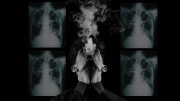Smoking is one of the largest risk factors for contracting or dying from tuberculosis (TB), and in a study published today, Harvard researchers described a mechanism that may finally explain why. They also identified two types of existing drugs that may help reverse the effect.
Tobacco smoke, they found, recruits specific immune cells into the lungs, and once there, those cells allow Mycobacterium tuberculosis (Mtb), the bacteria that causes the disease, to proliferate. The effect is profound, said Douglas Kwon, an associate professor of medicine and physician scientist at the Ragon Institute of Mass General, MIT, and Harvard. An infectious disease specialist, Kwon was one of the study’s senior authors. “These very specific types of immature inflammatory monocytes”—white blood cells—“are just very good at allowing TB to replicate in them,” he said.
Tuberculosis exacts a heavy toll, affecting 20 percent of the global population. According to the World Health Organization, it is the second leading infectious killer, after COVID-19 (and ahead of HIV and AIDS). In 2022, 1.3 million people died from the disease, and another 10.6 million fell ill with it. Scientists have long known that smoking significantly raises the risk of acquiring tuberculosis and doubles the risk of reactivating a latent infection, “but there wasn’t a lot of mechanistic insight into how that very strong epidemiologic connection occurred,” Kwon said. Worldwide about 1.3 billion people smoke tobacco, and previous research has estimated that smoking contributes to 10 to 20 percent of all annual active tuberculosis cases. Across the globe, there is significant overlap between regions with high rates of smoking, and regions with high rates of tuberculosis. “The convergence of those seems to be particularly synergistic,” Kwon said.
One of the other senior authors, Benjamin Medoff, M.D. ’94, chief of pulmonary and critical care medicine at Mass General Brigham, found it noteworthy that the body’s inflammatory response worsened the effect of the bacteria. “You would think that more inflammation would mean more clearance of tuberculosis, or bacteria, or any infection,” he said. “But in this case, it makes a person more susceptible to Mtb….That’s one of the things that probably makes Mtb harder to clear from the body: it takes advantage of normal immune responses and subverts them and is able to escape.”
Kwon agreed. It was interesting he said, that smoking “didn’t increase all immune cells. There seems to be specificity for this particular type of immune cell, and it seems to be particularly detrimental to TB. So, TB seems to have learned to co-opt the immune response caused by smoking and use that to its advantage.”
Published in Science Translational Medicine, the paper also identified anti-inflammatory drugs that could be used as treatment to inhibit the growth of Mtb within lung cells. One is dexamethasone, a corticosteroid used to treat a wide range of conditions, including arthritis, cancer, and immune system disorders. Dexamethasone is already approved to treat patients with TB-associated meningitis and TB-associated immune reconstitution inflammatory syndrome (TB-IRIS), a serious condition caused by an excessive immune response to the disease. Another drug, SP600125, also inhibited the growth of tuberculosis bacteria in the lung. A small-molecule kinase inhibitor—meaning it blocks the action of specific protein enzymes—it is currently used to treat certain cancers.
Coauthored by a team of 13 researchers—basic scientists, translational researchers, and clinicians who see TB patients—the study used multiple methods, including single-cell sequencing (which examines the genomes of individual cells) and flow cytometry (which analyzes individual cells as they flow past a series of lasers), as well as functional experiments with cells in vitro. The researchers recruited nearly 80 participant donors, all from the local Boston area, and collected lung samples from them using research bronchoscopy, a process that involves sending a thin, flexible tube into the lungs, outfitted with a camera, “and then we drive around and sample specific areas by squirting a little saline in and then sucking it back out, which brings in cells from the lining of the lung,” said Medoff.
This kind of sampling is technically difficult and complicated, but important to do, Medoff said. “A lot of studies just look at the blood, because it’s obviously easy to get blood from people, and getting lung samples is harder. But if you’re looking for lung disease,” he said, “you should be in the organ where the disease is.”
Further research could uncover more details of the connection between TB and immune cells—“We’d like to better understand that on a molecular level,” Kwon said, and study the outcomes of potential therapies in patients. “There’s a lot of work just on the basic mechanisms that’s still being worked out,” Medoff added. Much of that work “has relevance not only to TB, but COPD [chronic obstructive pulmonary disease], asthma, and other inflammatory lung diseases.”









